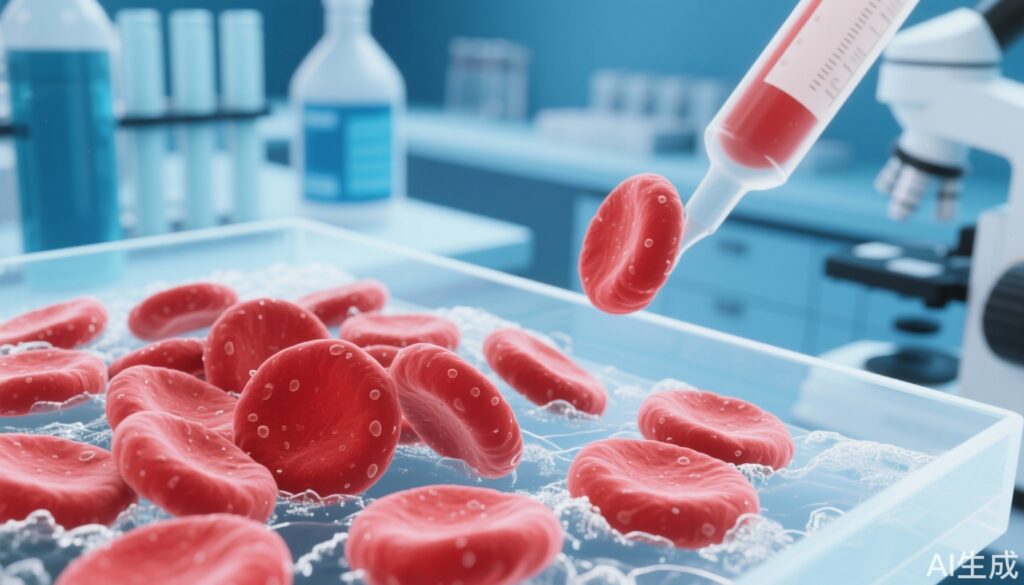Highlight
Cold Agglutinin Syndrome (CAS) often emerges around 10 days after the onset of Mycoplasma pneumoniae (MP) respiratory infection symptoms in adults. CAS is characterized by significant hemolytic anemia requiring frequent transfusions and is associated with high rates of intensive care unit (ICU) admissions and venous thromboembolic events (VTE). Despite these complications, 90% of patients recover, and glucocorticoid therapy does not significantly influence recovery outcomes.
Study Background and Disease Burden
Mycoplasma pneumoniae is a common respiratory pathogen primarily causing atypical pneumonia. Beyond pulmonary manifestations, MP is implicated in various extra-pulmonary complications, including cold agglutinin syndrome (CAS), a form of autoimmune hemolytic anemia characterized by cold-reactive autoantibodies. CAS is a rare but serious condition leading to red blood cell agglutination, hemolysis, and anemia. Hospitalized adult patients with MP infection and CAS often experience significant morbidity due to anemia and complications such as venous thromboembolism (VTE). Understanding the natural history, risk factors, and optimal management of MP-associated CAS is essential to improving patient outcomes, as current evidence remains limited and treatment decisions vary widely in clinical practice.
Study Design
The MyCOLD Study is a national, multicenter, observational, ambispective cohort study conducted in France to comprehensively characterize adult patients hospitalized with MP infection complicated by CAS. Inclusion criteria comprised confirmed MP infection, hemolytic anemia with hemoglobin levels below 10 g/dL, and a positive C3 direct antiglobulin test indicative of complement-mediated hemolysis. The primary endpoint was recovery, defined as sustained hemoglobin above 10 g/dL without hematological therapies. Secondary endpoints included incidence of ICU admission, requirement of red blood cell transfusions, occurrence of venous thromboembolic events (VTE), mortality, and impact of glucocorticoid therapy. Outcomes were compared with a large control cohort of MP-infected patients without CAS from the MYCADO study.
Key Findings
The study included 60 adult patients with a median age of 48.5 years, with slight female predominance (51.7%). CAS diagnosis was made at a median of 10 days (interquartile range not specified) following MP-symptom onset, consistent with a delayed autoimmune phenomenon post infection. At diagnosis, median hemoglobin was critically low at 6.9 g/dL, and 71.7% of patients required red blood cell transfusions indicative of clinically significant anemia.
Comparison of patients’ characteristics, biological and paraclinical findings and outcomes between patients with hospitalized Mycoplasma pneumoniae infection with (CAS) and without (No CAS) cold auto‐immune hemolytic anemia.
| All (N = 1327) | CAS (N = 60) | No CAS (N = 1267) | p | |
|---|---|---|---|---|
| General patients’ characteristics | ||||
| Sex (females) | 596 (44.9) | 31 (51.7) | 565 (44.6) | 0.4 |
| Age at diagnosis | 44 (32–63) | 48.5 (38–61) | 43 (31–63) | 0.2 |
| Patients’ characteristics at diagnosis | ||||
| Respiratory manifestation | 1263 (95.2) | 58 (96.7) | 1205 (95.1) | > 0.99 |
| Cutaneous manifestations | 81 (6.1) | 19 (31.7) | 62 (4.9) | < 0.0001 |
| Cardiac manifestations | 176 (13.3) | 5 (8.3) | 171 (13.5) | 0.3 |
| Biological characteristics | ||||
| Hb (g/dL) | 13.0 (11.6–14.2) | 6.9 (5.9–8.07) | 13.1 (11.8–14.3) | < 0.0001 |
| Platelets (G/L) | 303 (223–410) | 452 (327–567) | 298 (221–402) | < 0.0001 |
| Leukocytes (G/L) | 10.7 (8.2–13.7) | 16.5 (11.0–25.4) | 10.6 (8.1–13.5) | < 0.0001 |
| Neutrophils (G/L) | 8.28 (5.9–11.1) | 11.8 (7.9–17.5) | 8.2 (5.9–10.9) | < 0.0001 |
| Lymphocytes (G/L) | 1.3 (0.9–1.7) | 2.0 (1.3–3.2) | 1.2 (0.9–1.7) | < 0.0001 |
| Total bilirubin (μmol/L) | 9.0 (6.0–13.0) | 43.0 (22.1–69.0) | 8.9 (6–12.7) | < 0.0001 |
| CRP (mg/mL) | 131 (68–200) | 138 (68–207) | 130 (68–199) | 0.7 |
| AST (IU/L) | 35 (25–57) | 60.5 (39–77) | 34 (24–54) | < 0.0001 |
| ALT (IU/L) | 35 (21–60) | 48 (29–72) | 34 (21–59) | 0.005 |
| GGT (IU/L) | 46 (26–88) | 57 (28–95) | 46 (26–88) | 0.6 |
| ALP (IU/L) | 80 (61–109) | 93 (74–117) | 80 (60–107) | 0.01 |
| Chest imaging | ||||
| Chest CT‐scan | 914/1324 (69.0) | 47 (78.3) | 867/1264 (68.6) | 0.2 |
| Bronchial wall thickening | 334/1311 (25.5) | 11/46 (23.9) | 323/1265 (25.5) | 0.9 |
| Bronchiolitis | 597/1311 (45.5) | 30/46 (65.2) | 567/1265 (44.8) | 0.01 |
| Interstitial lung pattern | 283/1311 (21.6) | 11/46 (23.9) | 272/1265 (21.5) | 0.8 |
| Alveolar condensation | 595/1311 (45.4) | 37/46 (80.4) | 558/1265 (44.1) | < 0.0001 |
| Pulmonary embolism | 29/1325 (2.2) | 8 (13.3) | 21/1265 (1.7) | < 0.0001 |
| Outcomes | ||||
| ICU admission | 419/1325 (31.6) | 27 (45.0) | 392/1265 (31) | 0.03 |
| Death | 29/1324 (2.2) | 2 (3.3) | 27/1264 (2.1) | 0.4 |
Intensive care unit admission was necessary for 45% of cases, highlighting the severity of CAS-associated complications. Notably, 16.7% experienced venous thromboembolic events, a complication significantly more frequent compared to MP patients without CAS (p < 0.0001), suggesting a prothrombotic state linked to hemolysis or inflammation in CAS.
Therapeutically, 28.3% of patients received glucocorticoids alone, while the majority (66.7%) underwent no specific CAS-directed treatment beyond supportive care. Despite widespread use, glucocorticoids did not significantly modify the rate or timing of hematological recovery, indicating limited efficacy in this context.
After a median follow-up of 56 days, 90% of patients attained recovery defined by hemoglobin normalization without therapy, affirming that CAS secondary to MP generally has a favorable prognosis. Mortality occurred in 3.3% of cases due to sepsis and pulmonary embolism, underscoring the importance of vigilant supportive care.
Compared with a cohort of 1,267 MP-infected adults without CAS, those with CAS had markedly higher ICU admission rates (p = 0.03) and VTE incidence (p < 0.0001), emphasizing the clinical burden imposed by CAS.
Expert Commentary
This large observational study reinforces that CAS is a serious, though usually self-limited, complication of MP infection in adults. The strong association with thromboembolic events calls for heightened clinical vigilance and consideration for thromboprophylaxis in selected cases, although formal guidelines remain lacking. The lack of observed benefit from glucocorticoids aligns with the autoimmune hemolysis being complement-mediated rather than driven predominantly by cellular immune mechanisms, suggesting alternative therapeutic targets like complement inhibitors may warrant exploration.
Limitations include the observational design and variability in treatment strategies, which preclude definitive conclusions on management. However, the substantial patient number and inclusion across multiple centers enhance the generalizability of findings. Further prospective studies could clarify the role of anticoagulation and novel immunomodulatory therapies.
Conclusion
Cold agglutinin syndrome secondary to Mycoplasma pneumoniae infection in adults is a delayed autoimmune hemolytic anemia occurring roughly 10 days after symptom onset. It is associated with serious complications such as ICU admission and venous thromboembolism, yet most patients recover without targeted immunosuppressive therapy. Glucocorticoids, commonly used in clinical practice, do not significantly affect recovery rates or timing. These insights highlight the need for improved clinical strategies focusing on complication prevention and support the exploration of complement-targeted therapies in this setting.
References
Chevalier K, Holub M, Palich R, Blanckaert K, Gilardin L, Terriou L, Arnould B, Bellaiche S, Deshayes S, Mérindol J, Rolland S, Valentin S, Amarsy R, Audia S, Baltes V, Barret A, Cariou PL, Cattelan J, Chassepot H, Chopin D, Clément M, Coeffier M, Comont T, De Monteynard S, Declerck C, Durand P, Ebbo M, Galli G, Godot A, Hamrouni S, Kaeuffer C, Kahn JE, Lassel L, Leautez S, Lecapitaine AL, Le Moal G, Luque Paz D, Martinot M, Mrozek N, Pagis V, Perpoint T, Salle V, Viallard JF, Viguier C, Mahevas M, Godeau B, Crickx E, Michel M. Cold Agglutinin Syndrome Secondary to Mycoplasma pneumoniae Infection in Adults: Results From a Large French Observational Study (MyCOLD Study). Am J Hematol. 2025 Sep;100(9):1557-1565. doi: 10.1002/ajh.70010 . Epub 2025 Jul 19. PMID: 40682504 ; PMCID: PMC12326233 .



